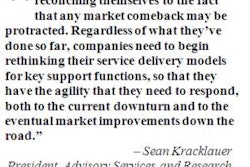
Milton Keynes, UK — January 11, 2010 — International headlines appear seemingly on a weekly basis declaring the consequences caused by inappropriately managing supplier risk throughout the supply chain management process, says Simon Clark, business development manager for Europe, Middle East and Africa at CargoWise edi, a provider of integrated international supply chain logistics management systems. And, Clark says, during this still unpredictable business climate, the list of financial risks continues to grow.
"Logistics service providers (LSPs) in the air freight sector are often lax in administering the financial risk involved with managing their suppliers at a time when diligence is critical for business success," says Clark. "In business today, it is vital to keep a tight rein on all finances, to keep expenditures under control and identify true ROI."
From a credit management point of view, Clark suggests, it is essential to maintain control over the financial status of debtors to minimize the risk of building bad debt; and from a service cost perspective, it is also important that LSPs ensure that their credit lines with vendors are adequate without causing unnecessary financial risk.
Clark points out that a clear and total view of all company finances is needed to ensure the overall well-being of a business. An accurate assessment of the business' complete monetary risk situation is necessary to ensure that its credit control team is monitoring all activity and chasing the right debt, and that its procurement team can carefully weigh the offers being made by suppliers.
Similarly, he says, companies must not forget the significance of assessing revenue stream when reigning in financial risk. From the moment an operator prices a job at entry point, the ideal situation is to have complete visibility of the entire job process through an accrued revenue method, he says. Once the job is correctly entered into the accounting system it is important to manage it closely to ensure it is invoiced to the correct person in the correct company for the correct value with the correct terms.
"The most reliable solution to achieving this kind of comprehensive control over financial risk lies in implementing a totally integrated accounting system that accurately reflects the most current data for all transactions," he continues. "This begins at entry point — as soon as an accrual is entered onto the job-costing screen of a shipment. These cost accruals can then be electronically monitored, managed, matched and reported from the moment they are entered into the system. Any discrepancies in financial status can be reported with a full audit trail, ensuring that cost control risks are minimized throughout the supply chain process."
With the right security levels applied to sensitive financial information, even the operators on the freight desk should be able to see the impact of their actions to ensure that there are no loss-leading job files, says Clark. This means staff should be able to ascertain if they are maximizing the yield on each consolidation.
"Once this information is automated, and the process to manage it is stable and accurate, the business can rest assured that its operational teams are making the right decisions to minimize financial risk," he says. "Data can be monitored against departmental budgets, and by making this control information available through the CRM process, it enables the sales force and the business management department to focus their administrative efforts on exercising good financial transaction practices, rather than just relying on any accounting process, especially those done manually."
In the current global business climate, Clark notes, it is essential to focus on executing the right financial system at the right price, not just taking on any business and allowing it to become unsustainable (undeliverable, time consuming, poor payment record, etc.). "It's especially important today to more carefully profile the markets served and target clients for risk versus profitable business on the right credit terms. This more aggressive marketing approach helps ensure that financial risk is mitigated throughout the supply chain process," he says.
Clark cites the trend toward new technology options as an area where LSPs can streamline overall operations, minimize upfront expenditures and format their reporting data to their specific requirements in order to optimize financial risk. Integrated accounts data permit informed real-time decisions to be made at every step of the client and supplier relationship, from the original entry of figures, through job costing, into a single accounting system that reflects all the overheads and sundry transactions through the power of reliable, timely data capture, he suggests.
"For LSPs in the air freight sector, massive gains can also be found in a company's cargo accounts settlement systems (CASS) procedures by electronically reconciling statements, as opposed to doing it manually," says Clark. "Automation saves time and reduces the risk of errors that are introduced into a time-consuming manual process. With an integrated IT solution, the required information exists in an all-inclusive accounting system that holds all the answers."
Clark argues that the power of a single view into the entire supply chain process and an associated risk assessment through an integrated accounting system is enormous. "In today's business environment of reduced margins and shorter credit terms, it is essential that LSPs use software technology to support this vision to its fullest capability," he asserts. "Customizable electronic screen views, drilldown and report writing capabilities all make the delivery of this type of electronic solution complete — ultimately reigning in financial risk."
CargoWise edi provides solutions for forwarders, customs brokers and logistics service providers focused on supply chain execution capability in an integrated ERP-like globally capable system. The company says that every day, 1,300 logistics service providers, consisting of 33,000 users in 45 countries, move goods through the global supply chain using CargoWise edi's flagship product ediEnterprise.
"Logistics service providers (LSPs) in the air freight sector are often lax in administering the financial risk involved with managing their suppliers at a time when diligence is critical for business success," says Clark. "In business today, it is vital to keep a tight rein on all finances, to keep expenditures under control and identify true ROI."
From a credit management point of view, Clark suggests, it is essential to maintain control over the financial status of debtors to minimize the risk of building bad debt; and from a service cost perspective, it is also important that LSPs ensure that their credit lines with vendors are adequate without causing unnecessary financial risk.
Clark points out that a clear and total view of all company finances is needed to ensure the overall well-being of a business. An accurate assessment of the business' complete monetary risk situation is necessary to ensure that its credit control team is monitoring all activity and chasing the right debt, and that its procurement team can carefully weigh the offers being made by suppliers.
Similarly, he says, companies must not forget the significance of assessing revenue stream when reigning in financial risk. From the moment an operator prices a job at entry point, the ideal situation is to have complete visibility of the entire job process through an accrued revenue method, he says. Once the job is correctly entered into the accounting system it is important to manage it closely to ensure it is invoiced to the correct person in the correct company for the correct value with the correct terms.
"The most reliable solution to achieving this kind of comprehensive control over financial risk lies in implementing a totally integrated accounting system that accurately reflects the most current data for all transactions," he continues. "This begins at entry point — as soon as an accrual is entered onto the job-costing screen of a shipment. These cost accruals can then be electronically monitored, managed, matched and reported from the moment they are entered into the system. Any discrepancies in financial status can be reported with a full audit trail, ensuring that cost control risks are minimized throughout the supply chain process."
With the right security levels applied to sensitive financial information, even the operators on the freight desk should be able to see the impact of their actions to ensure that there are no loss-leading job files, says Clark. This means staff should be able to ascertain if they are maximizing the yield on each consolidation.
"Once this information is automated, and the process to manage it is stable and accurate, the business can rest assured that its operational teams are making the right decisions to minimize financial risk," he says. "Data can be monitored against departmental budgets, and by making this control information available through the CRM process, it enables the sales force and the business management department to focus their administrative efforts on exercising good financial transaction practices, rather than just relying on any accounting process, especially those done manually."
In the current global business climate, Clark notes, it is essential to focus on executing the right financial system at the right price, not just taking on any business and allowing it to become unsustainable (undeliverable, time consuming, poor payment record, etc.). "It's especially important today to more carefully profile the markets served and target clients for risk versus profitable business on the right credit terms. This more aggressive marketing approach helps ensure that financial risk is mitigated throughout the supply chain process," he says.
Clark cites the trend toward new technology options as an area where LSPs can streamline overall operations, minimize upfront expenditures and format their reporting data to their specific requirements in order to optimize financial risk. Integrated accounts data permit informed real-time decisions to be made at every step of the client and supplier relationship, from the original entry of figures, through job costing, into a single accounting system that reflects all the overheads and sundry transactions through the power of reliable, timely data capture, he suggests.
"For LSPs in the air freight sector, massive gains can also be found in a company's cargo accounts settlement systems (CASS) procedures by electronically reconciling statements, as opposed to doing it manually," says Clark. "Automation saves time and reduces the risk of errors that are introduced into a time-consuming manual process. With an integrated IT solution, the required information exists in an all-inclusive accounting system that holds all the answers."
Clark argues that the power of a single view into the entire supply chain process and an associated risk assessment through an integrated accounting system is enormous. "In today's business environment of reduced margins and shorter credit terms, it is essential that LSPs use software technology to support this vision to its fullest capability," he asserts. "Customizable electronic screen views, drilldown and report writing capabilities all make the delivery of this type of electronic solution complete — ultimately reigning in financial risk."
CargoWise edi provides solutions for forwarders, customs brokers and logistics service providers focused on supply chain execution capability in an integrated ERP-like globally capable system. The company says that every day, 1,300 logistics service providers, consisting of 33,000 users in 45 countries, move goods through the global supply chain using CargoWise edi's flagship product ediEnterprise.















![Pros To Know 2026 [color]](https://img.sdcexec.com/mindful/acbm/workspaces/default/uploads/2025/08/prostoknow-2026-color.mduFvhpgMk.png?ar=16%3A9&auto=format%2Ccompress&bg=fff&fill-color=fff&fit=fill&h=135&q=70&w=240)


